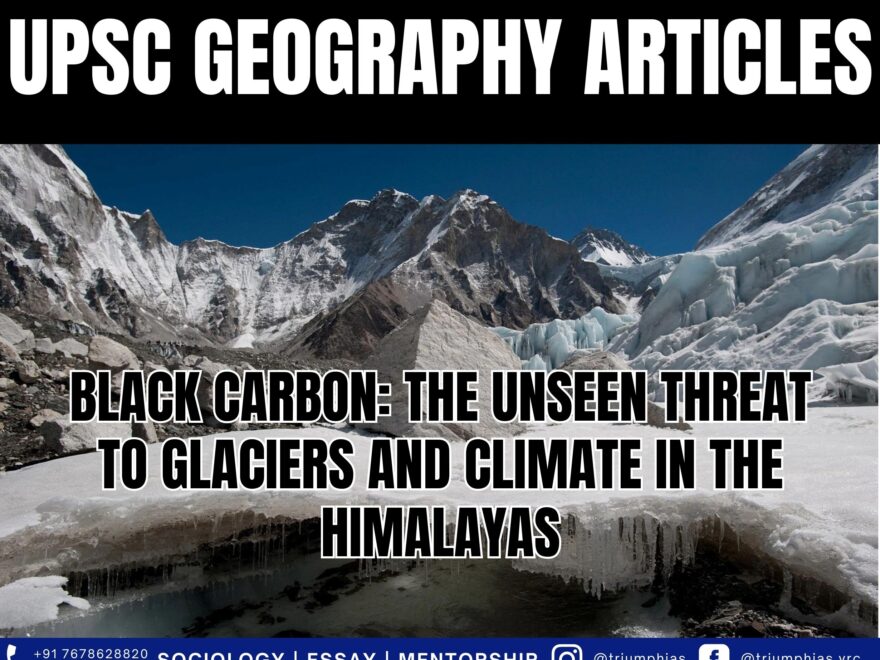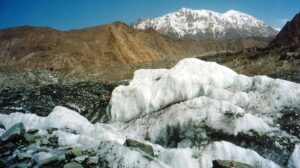Black Carbon
(Relevant for Geography Section of General Studies Paper Prelims/Mains)
Black Carbon: Its impact on glaciers
Black carbon, frequently responsible for glacier retreat, is released into the atmosphere as a result of the inadequate combustion of fossil fuels in vehicle and aircraft exhausts, as well as from bio fuel and biomass combustion.
- Black Carbon, the second-largest contributor to global warming after carbon dioxide (CO2), is a short-lived pollutant. Unlike other greenhouse gas emissions, Black Carbon is swiftly removed from the atmosphere through precipitation, making its impact reversible if emissions cease. In contrast to historical carbon emissions, its effects are localized, exerting a stronger influence on nearby areas.
- Black Carbon falls within the category of aerosols, and it holds significance among aerosols like brown carbon and sulphates. It stands as the second most significant anthropogenic factor driving climate change and serves as a primary indicator for comprehending the detrimental consequences linked with air pollution.
- Emission of Black Carbon occurs from various sources including gas and diesel engines, coal-fired power plants, and other fossil fuel burning activities. It constitutes a significant portion of particulate matter (PM), which is a prevalent air pollutant.
Impacts of Black Carbon on the Glacier
It operates through two mechanisms that accelerate glacier melting:
- By reducing the sunlight’s reflective ability on the surface.
- By elevating the air temperature.
Materials that are black in color have a higher tendency to absorb light and emit infrared radiation, which subsequently raises the temperature. Consequently, an elevated presence of black carbon in the high Himalayas will contribute to an expedited melting process of the glaciers in the region.
Over the long term, alterations in the atmospheric composition of the high Himalayas will have repercussions on the patterns of rain and snowfall. This, in turn, will influence the natural resources and socio-economic activities of the communities residing in the Himalayan region.
Utilizing real-time data from weather stations, an examination of black carbon concentrations and seasonal fluctuations in the high Himalayas has been conducted. The research reveals that the concentration of black carbon witnesses an increase during the summer months due to various contributing factors.
Measures to be taken
- In the Himalayas, reducing black carbon emissions from cook stoves, diesel engines, and open burning would have the greatest impact and could significantly reduce radiative forcing and help to maintain a greater portion of Himalayan glacier systems.
- Banning fossil fuels or the introduction of glacier tax can be a deterrent in these high-altitude areas.
Even a minor change of 1 degree Celsius will result in a major decrease in the area under snow cover along Himalayan glaciers, along with a major loss to flora and fauna. Hence, it is imperative to take actions to reduce the black carbon concentration in the region.
To master these intricacies and fare well in the Sociology Optional Syllabus, aspiring sociologists might benefit from guidance by the Best Sociology Optional Teacher and participation in the Best Sociology Optional Coaching. These avenues provide comprehensive assistance, ensuring a solid understanding of sociology’s diverse methodologies and techniques.
Black Carbon, Glacier Melt, Climate Change, Himalayas, Global Warming, Air Pollution, Short-lived Pollutants, Radiative Forcing, Particulate Matter, Sustainable Measures, Fossil Fuels, Cook Stoves, Glacier Tax, Black Carbon, Glacier Melt, Climate Change, Himalayas, Global Warming, Air Pollution, Short-lived Pollutants, Radiative Forcing, Particulate Matter, Sustainable Measures, Fossil Fuels, Cook Stoves, Glacier Tax, Best Sociology Optional Coaching, Sociology Optional Syllabus.

Choose The Best Sociology Optional Teacher for IAS Preparation?
At the beginning of the journey for Civil Services Examination preparation, many students face a pivotal decision – selecting their optional subject. Questions such as “which optional subject is the best?” and “which optional subject is the most scoring?” frequently come to mind. Choosing the right optional subject, like choosing the best sociology optional teacher, is a subjective yet vital step that requires a thoughtful decision based on facts. A misstep in this crucial decision can indeed prove disastrous.
Ever since the exam pattern was revamped in 2013, the UPSC has eliminated the need for a second optional subject. Now, candidates have to choose only one optional subject for the UPSC Mains, which has two papers of 250 marks each. One of the compelling choices for many has been the sociology optional. However, it’s strongly advised to decide on your optional subject for mains well ahead of time to get sufficient time to complete the syllabus. After all, most students score similarly in General Studies Papers; it’s the score in the optional subject & essay that contributes significantly to the final selection.
“A sound strategy does not rely solely on the popular
Opinion of toppers or famous YouTubers cum teachers.”
It requires understanding one’s ability, interest, and the relevance of the subject, not just for the exam but also for life in general. Hence, when selecting the best sociology teacher, one must consider the usefulness of sociology optional coaching in General Studies, Essay, and Personality Test.
The choice of the optional subject should be based on objective criteria, such as the nature, scope, and size of the syllabus, uniformity and stability in the question pattern, relevance of the syllabic content in daily life in society, and the availability of study material and guidance. For example, choosing the best sociology optional coaching can ensure access to top-quality study materials and experienced teachers. Always remember, the approach of the UPSC optional subject differs from your academic studies of subjects. Therefore, before settling for sociology optional, you need to analyze the syllabus, previous years’ pattern, subject requirements (be it ideal, visionary, numerical, conceptual theoretical), and your comfort level with the subject.
This decision marks a critical point in your UPSC – CSE journey, potentially determining your success in a career in IAS/Civil Services. Therefore, it’s crucial to choose wisely, whether it’s the optional subject or the best sociology optional teacher. Always base your decision on accurate facts, and never let your emotional biases guide your choices. After all, the search for the best sociology optional coaching is about finding the perfect fit for your unique academic needs and aspirations.
To master these intricacies and fare well in the Sociology Optional Syllabus, aspiring sociologists might benefit from guidance by the Best Sociology Optional Teacher and participation in the Best Sociology Optional Coaching. These avenues provide comprehensive assistance, ensuring a solid understanding of sociology’s diverse methodologies and techniques. Sociology, Social theory, Best Sociology Optional Teacher, Best Sociology Optional Coaching, Sociology Optional Syllabus.
Best Sociology Optional Teacher, Sociology Syllabus, Sociology Optional, Sociology Optional Coaching, Best Sociology Optional Coaching, Best Sociology Teacher, Sociology Course, Sociology Teacher, Sociology Foundation, Sociology Foundation Course, Sociology Optional UPSC, Sociology for IAS,
Follow us :
🔎 https://www.instagram.com/triumphias
🔎https://www.youtube.com/c/TriumphIAS
https://t.me/VikashRanjanSociology
Find More Blogs
|
Scope of the subject and comparison with other social sciences |
|||
|
|
|
|
Modernity and social changes in Europe |


